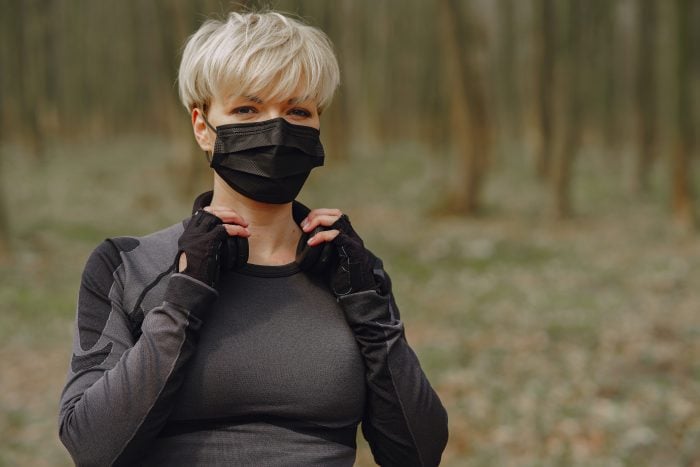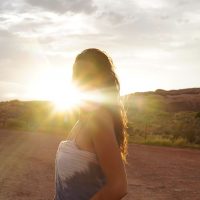I am a fortunate COVID-19 long-hauler, 31-year-old female, with no medical preconditions and no dependents.
I have access to a post-Covid-19 clinic, a supportive family, and dear friends who check in on me frequently.
I still cried my way through the first four months of dealing with Covid-19 symptoms, went to the emergency room two times, had days when I couldn’t feed myself, was overprescribed medication, felt incredible pain and countless relapses, needed many people to help me, and equally isolated myself from the many people I love in my life.
I was wheeled into doctors’ rooms, unable to speak for myself, and waited with unease between medical exams. After countless visits to different specialists—a rheumatologist, cardiologist, psychiatrist, neurologist, and pulmonologist—it was concluded that my autonomic nervous system was malfunctioning due to neurological damage and, since the cause was due to the mysterious Covid-19, there wasn’t any known solution.
There was a lot of fear, ambiguity, and darkness, but equally a lot of love, care, and discovery.
It’s been seven months since my first positive PCR test. I have moved in to live with my family for physical, emotional, and financial support. I dug into my psyche with a trusted teacher and have access to different doctors, a herbalist, and a mentor fellow, long-hauler endurance athlete.
I have been following a reconditioning routine alongside a specific diet with supplements, prioritizing sleep, breathwork, and meditation, and have cut out everything else in my life as I once knew it to be.
Having my physical body checked and access to resources and support allowed me the peace of mind and space to release the heavy, burdensome fears associated with Covid-19 and being potentially classified as chronically ill. It’s still there lurking—all parts of my healing.
But could healing be done differently? Yes.
Looking back, would I have changed anything? No.
For me, it’s all been part of my journey. I am here now, so I am grateful for every crumb that got me to this moment to be able to type this.
Would I tell someone they should do it my way? No, at least not without knowing their individual access to resources, where they are starting from, and their specific needs.
This is neither the beginning nor the end of my journey. Even if I were to conclude that I have healed and overcome personal obstacles, it is indubitably necessary to recognize that many people do not have access to the same support, resources, and people they feel they need.
Healing looks different for everyone. At times, I was lacking the necessities and at others, my mind kept telling me I didn’t have what I felt I needed, which led to more resistance and suffering. So much is dependent on where an individual is starting from, which is never clearly visible to someone else.
Our minds are so powerful, our brains can compute more than the entire Internet. However, it can also be inaccurate as it trickles and glistens with our conditioned cognitive biases. This is why some of our memories are factually incorrect. But as a simple reminder, this isn’t the same for everyone. Every mind, body, and spirit is on its own journey. So, if someone says, “I did this, so can you,” it denies the acknowledgment of another’s process. And even though their intention may be compassionate and empathic, it is often the opposite.
Empathy would be to recollect and recognize the intricacies and triggers we experienced on our own journey—the unique balance between our perceived obstacles versus the support we received, not just from one incident but from our whole being of recollections throughout our development and also, generationally. Thus, mirroring our own experience onto someone else’s and saying it is the same would be an inaccurate reflection.
Empathy guides us to acknowledge that some people are healing deep and difficult wounds. That they are carrying communal or generational grief and trauma that will not simply shift with an understandable idea or a belief system that sounds good, but with deeper guidance accompanied with being able to feel and move through emotions toward self-awareness.
This guidance can be in the form of a medical professional or it may not—it all depends on what is accessible in each person’s path.
Observing pain or fear, meeting with its origin, and diving into healing may be a challenge compared to physical healing. There is no one protocol and everything is connected. But feelings cannot be denied.
We perceive our own realities based on our subconscious mind which has been saturated with our environmental conditioning and our higher consciousness. This perception gives us feelings, which we then emote through emotionally fueled reactions.
This loop is constant and habituating. When a foreign concept or virus enters our bodies and alters its flow, it can deeply disrupt the perceived homeostasis we had been experiencing, which leads to a new opportunity for healing. Things we had once thought were finished years ago might resurface, whether emotionally or physically.
For example, I have experienced several concussions and, since I had the virus, I went through weeks when I felt concussed with mental blockages and disconnections. Another Covid-19 patient who had dengue fever years ago manifested the same symptoms in their body when they were diagnosed with Covid-19.
It seems that a virus sneaks in and attacks our weak spots. The weaker this spot within us, the stronger the virus might feel. This has no reflection on who we are, our values, or our worth, but rather depends on how much healing power is lodged within us. Being aware and taking an observatory stance allows space for healing. There are no shortcuts. It is not about pushing through, but diving in.
With all this being said about the power of our minds, we are not all experts on everything and we can only survive and thrive when we support each other. We need each other.
But we also still need doctors, research, and funding. We are not yet in that stage in our communal timeline where we can step away from our societal systems. Covid-19 is an opening door to reflect on how our systems can better support individuals with different needs, diagnoses, and symptoms. There are countless people with diagnoses that have been underfunded and unrecognized for years, since there wasn’t an urgency surrounding these illnesses on a global scale.
We are experiencing a shift in conscious awareness and, within this gradual shift, we individually need to be heard and understood.
When a doctor rebuked me for misunderstanding her instructions, I saw stress, pressure, and frustration with the lack of control. When another doctor overprescribed my medication and said, “Trust me, I’ve been doing this for 30 years,” I saw desperation to help, grasping to solutions, and lack of understanding. But when a doctor asked me to listen to my body and offered suggestions for us to decide on solutions together, I saw patience, openness, and support. I saw people working with people.
We all carry stories, narratives, emotions, and knowledge invisible to others. We choose what we want to make visible by deciding how to share them, when to share them, and with whom to share them.
We are widening our systems by sharing our stories. Patients, doctors, and educators are learning about cognitive and implicit biases, empathy, and elements of the subconscious psyche. For some, the psyche will be their healing guide while for others, it will be balancing out their homeostasis with prescriptions, procedures, and protocols.
Some might choose meditation while others might choose medication. But the choice should be based on giving the healing individual accessibility to resources and options; it should not be judged only based on schools of thought of what worked and what didn’t work for another individual.
Healing is an incredibly robust journey of evolution our species is adventuring on. It is a time to explore what we have here and now, what we can do, and how we can expand the accessibility of resources, support, and acceptance.
We are learning. We are healing together.


 Share on bsky
Share on bsky





Read 2 comments and reply